Visit Jingdezhen
Jingdezhen, a city renowned as the “Capital of Porcelain” boasts not only a profound ceramic cultural heritage but also beautiful natural scenery and a variety of tourist activities. As a national 5A-level tourist attraction, it has completely preserved traditional porcelain workshops and ancient porcelain-making techniques.
· The China Ceramics Museum in Jingdezhen is the earliest professional museum of ceramic art established after the founding of New China, with rich collections of porcelain, and it is also a national first-level museum. It is not only a landmark cultural attraction in Jingdezhen, but also a sacred place for ceramic art lovers at home and abroad. The museum collects and displays about 20,000 famous works produced in Jingdezhen during different historical periods since the Neolithic Age, including more than 500 national precious cultural relics. These exhibitions not only show the historical context of ceramic art but also reveal its profound cultural connotation.
· Visiting the Yaoli Scenic Area is also a major highlight of a trip to Jingdezhen. Located in the northeastern end of the porcelain capital, Yaoli enjoys the reputation as "the origin of porcelain, the hometown of tea, and the sea of forests". Here, you can enjoy the beautiful natural scenery but witness well-preserved ancient villages and streets, which make you feel like traveling back to ancient times. In Yaoli, you can wander on the bluestone paths, admire the ancient-styled buildings and picturesque rural scenery, and feel the tranquility and harmony.
· The Jingdezhen Imperial Kiln Museum, a palace carrying the profound history and splendid culture of the thousand-year-old porcelain capital, shines like a bright pearl embedded in the long river of time. Stepping into the Imperial Kiln Museum is like traveling through a tunnel of time, returning to the prosperous era of porcelain and brilliant craftsmanship. Every piece of porcelain displayed in the museum is a witness to history. You can witness the process of clay gradually taking shape in the hands of craftsmen, turning into exquisite artworks through firing and painting. Here, you can feel the contribution and influence of ceramic culture on Chinese culture and appreciate the unique charm of ceramic art.
· The appearance of the Jingdezhen Porcelain Palace resembles a Hakka enclosed house and a Fujian Yongding earthen building, exuding an ancient and dignified aura. This three-story building is filled with the charm of ceramics on every level. On the exterior walls, various colored porcelain pieces are embedded, including blue-and-white, delicate, pastel, and colored glaze porcelain. The porcelain fragments are cleverly pieced together, with half embedded in the walls and half exposed on the surface, arranged into various shapes. Stepping into the Porcelain Palace is like entering a world of ceramics. The first and second floors are adorned with porcelain panel paintings depicting the "Four Great Classics" of Chinese traditional culture.
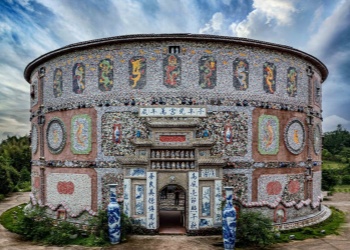
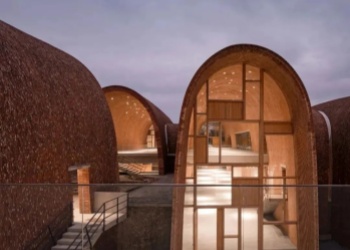
Jingdezhen Porcelain Palace The Jingdezhen Imperial Kiln Museum
Experiencing Local Folk Customs
· Ceramic Making Experience: In Jingdezhen, you can delve into a ceramic workshop and experience the whole process of ceramic making, including throwing, glazing, and painting. This will allow you to feel the charm of ceramic art but also understand the profound cultural heritage of Jingdezhen, the millennium porcelain capital.
· Attending Nuo Dance Performances: In Pingxiang, you can watch Nuo dance performances. Nuo dance is an ancient folk dance, mainly expressed through masks and dance, with a mysterious color and folk characteristics. By participating in it, you can experience the unique charm of this ancient art.
· Visiting Ancient Villages: Jiangxi boasts many well-preserved ancient villages, such as Huangling and Xiaoji in Wuyuan. Wandering through these villages, you can admire the quaint architectural style, feel the rural atmosphere, and understand the traditional way of life there.
· Participating in Traditional Festival Activities: Jiangxi's traditional festival activities are rich and colorful, such as dragon and lion dances during the Spring Festival and dragon boat races during the Dragon Boat Festival. Visiting Jiangxi at the right time, you can participate in these traditional festival activities, celebrate the festivals together with locals, and feel the festival atmosphere and folk customs.
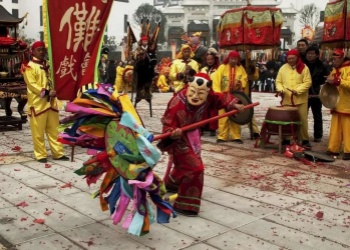
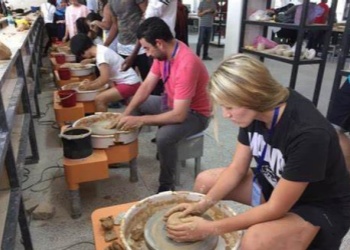
Attending Nuo Dance Performances Ceramic Making Experience
Experiencing Traditional Skills in Jiangxi
· Jingdezhen Ceramic Making: Jingdezhen, known as the capital of porcelain in China, boasts a long history of ceramic-making skills renowned worldwide. You can visit local ceramic workshops and experience various aspects of ceramic making, including throwing, glazing, and painting, to feel the charm of ceramic art.
· Wuyuan Jialu Oil Paper Umbrella Making: In Wuyuan County, you can learn how to make Jialu oil paper umbrellas. This ancient and exquisite craft involves multiple processes, including sawing bamboo, installing handles, lining the umbrella, painting, and brushing tung oil. Making an oil paper umbrella by hand is a continuation of traditional craftsmanship but a unique cultural experience.
· Experiencing the Construction Skills of Lukeng Traditional Houses: In Taihe County, Jiangxi Province, you can experience the construction skills of Lukeng traditional houses. This craftsmanship covers multiple fields such as architecture, carving, and fine arts, with strong local characteristics and artistic value. You have the opportunity to take part in the construction process of these houses and gain an understanding of the structural and decorative features of traditional architecture.
· Bamboo Weaving Craftsmanship: Jiangxi's bamboo weaving craftsmanship has a long history and exquisite skills. You can visit local bamboo weaving workshops, learn the basic techniques of bamboo weaving, and make some small bamboo woven items, such as baskets and penholders. This is an experience of craftsmanship but an appreciation of the clever use of natural materials.
· Traditional Paper-cutting Art: Jiangxi's paper-cutting art is exceptional. You can learn paper-cutting techniques from local artists and create exquisite patterns by hand. Paper-cutting art has decorative value and encompasses rich cultural connotations and folk customs.
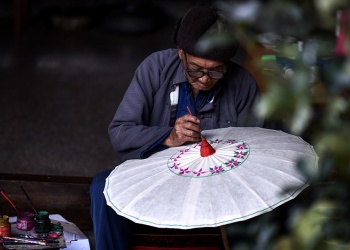
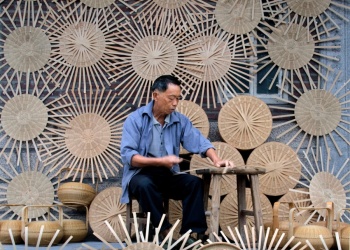
Wuyuan Jialu Oil Paper Umbrella Making Bamboo Weaving Craftsmanship
Jiangxi Mountain Climbing Tours
Jiangxi's mountain climbing tours offer a diverse and enriching experience. Below are detailed introductions to Wugong Mountain, Lushan Mountain, Sanqing Mountain, Mingyue Mountain, and Longhu Mountain as mentioned:
· Wugong Mountain: Renowned for its alpine meadows, sea of clouds, and sunrises, as well as its abundant outdoor activities, Wugong Mountain offers a unique climbing experience. During the ascent, you will witness the transition from dense forests to alpine meadows, experiencing the diversity of natural ecology. At the summit, the breathtaking sea of clouds and sunrises await, which are signature attractions of Wugong Mountain. Additionally, the mountain offers a range of outdoor activities such as hiking, camping, and photography, catering to various interests and preferences.
· Lushan Mountain: Lushan Mountain captivates visitors with its beautiful landscape and profound historical and cultural heritage. Must-visit attractions include Wulao Peak, Sandie Spring, and Jinxiu Valley. Climbing Lushan Mountain allows you to appreciate its scenic beauty throughout the seasons, from the blooming azaleas in spring, the sea of clouds in summer, and the fiery autumn leaves, to the snow-covered scenery in winter. Furthermore, Lushan Mountain is an important birthplace of Chinese culture, with ancient buildings, inscriptions, and poems reflecting its rich historical depth.
· Sanqing Mountain: Dubbed the "First Fairy Mountain Under the Heaven," Sanqing Mountain is renowned for its breathtaking natural scenery and rich Taoist culture. Key attractions include Yujing Peak, South Coast, and West Coast. Climbing Sanqing Mountain offers views of its unique granite peak forest landscape, a magnificent sea of clouds, and sunrises and sunsets, revealing the charm of nature. Additionally, Sanqing Mountain is a sacred site of Taoist culture, with temples, inscriptions, and legends reflecting the deep-rooted Taoist traditions.
· Mingyue Mountain: Mingyue Mountain is loved by tourists for its scenic landscape and outdoor activities. Highlights include Qingyun Plank Road, Moon Lake, and Yangshan Ancient Temple, each with its unique charm. Here, you can enjoy hiking, scenery appreciation, and photography, experiencing the harmonious fusion of nature and humanity. Furthermore, Mingyue Mountain is a great destination for hot spring vacations, with spas at the foot of the mountain offering a relaxing and rejuvenating environment.
· Longhu Mountain: As one of the birthplaces of Taoism in China, Longhu Mountain is famous for its profound Taoist culture and magnificent Danxia landforms. Ancient architectural landmarks such as Da Shangqing Temple and Tianshi Temple are important cultural relics of Taoism. Climbing Longhu Mountain allows you to immerse in the rich Taoist atmosphere and learn about the history and culture of Taoism. Additionally, the natural scenery of Longhu Mountain is also captivating, with its unique Danxia landscapes and clear springs and waterfalls.
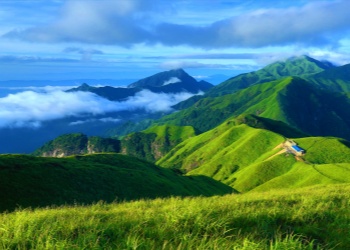
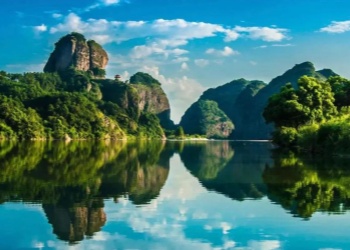
Wugong Mountain Longhu Mountain
Experiencing Jiangxi Opera
Jiangxi boasts a diverse range of operas, each with its unique characteristics, showcasing the profound cultural heritage and artistic charm of the province.
· Gan Opera: Gan Opera is a traditional local opera in Jiangxi Province and also a national-level intangible cultural heritage. Originating from northeastern Jiangxi, it incorporates Yiyang Tune, one of the four major vocal styles of the Ming Dynasty, and Kun Opera and Luantan, which were introduced to Jiangxi in the mid-Qing Dynasty. Gan Opera is renowned for its ancient and robust performance style, rich vocal system, and strong local flavor.
· Cai Cha Opera: Cai Cha Opera is a popular local opera form in Jiangxi, including Gandong Cai Cha Opera and Ji'an Cai Cha Opera. These operas often focus on folk stories and labor life as their themes, with cheerful melodies and lively performance forms, making them deeply loved by the masses.
· Donghe Opera: Donghe Opera is a traditional opera from the Donghe area of Ganzhou City, Jiangxi Province, featuring three major vocal styles: Gao, Kun, and Tan. Based on the local Gao Tune, it has evolved by incorporating various operatic elements such as Kunqu Opera and Yihuang Tune, exhibiting regional characteristics.
· Guangchang Meng Opera: Guangchang Meng Opera is a specific form of opera dedicated to the story of Meng Jiangnu. Its melodies are based on tune patterns, singing both northern and southern tunes, commonly known as Xuhe Gaoqiang. This opera form is widely circulated within Guangchang County and serves as an essential component of local culture.
· Yiyang Tune: Yiyang Tune is an ancient traditional operatic vocal style in China, originating from Southern Opera and forming during the late Yuan and early Ming dynasties. It combined with local Gan dialects and traditional folk music in Yiyang, Jiangxi, and evolved by absorbing northern tunes, possessing a unique artistic charm.
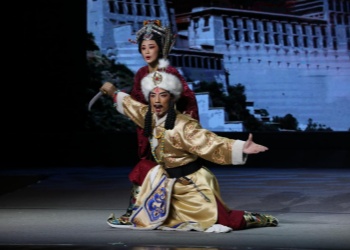
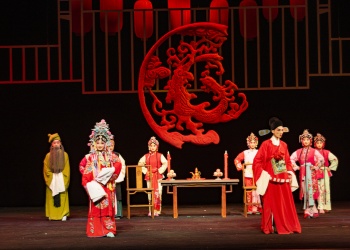
Gan Opera Yiyang Tune
Shopping
· Jingdezhen Porcelain: Jingdezhen, known as the "City of Porcelain" in China, has a long history and is renowned for its exquisite craftsmanship in porcelain making. Whether it's tea sets, tableware, or decorative items, Jingdezhen porcelain is beloved for its beautiful shapes and delicate textures. Buying a piece of Jingdezhen porcelain not only allows you to appreciate its unique beauty but also makes for a wonderful collector's item or gift.
· Gannan Navel Oranges: Gannan Navel Oranges are a geographical indication product of Jiangxi, renowned for their juicy flesh, bright color, and high sugar content. Buying some Gannan Navel Oranges to enjoy at home can satisfy your taste buds while also experiencing the beauty of Jiangxi's specialties.
· Lushan Cloud and Mist Tea: Lushan Cloud and Mist Tea is a type of green tea from Jiangxi, highly praised for its unique aroma and taste. Purchasing Lushan Cloud and Mist Tea not only allows you to taste its refreshing flavor but also brings a sense of tranquility and elegance to the process of brewing tea.
· Jiangxi Specialty Snacks: Jiangxi is famous for its delicious snacks, such as Nanchang Fried Rice Noodles, Pottery Soup, and Jiujiang Osmanthus Cake. These snacks not only have unique flavors but also exhibit strong local characteristics. Buying some Jiangxi specialty snacks can be enjoyed by yourself or given as gifts to friends and family.
· Gan Embroidery Crafts: Gan Embroidery is a traditional handicraft from Jiangxi, renowned for its exquisite embroidery techniques and unique cultural connotations. Purchasing a Gan Embroidery craft, such as an embroidered hanging scroll or embroidered pillow, allows you to appreciate its artistic value while also experiencing the cultural charm of Jiangxi.
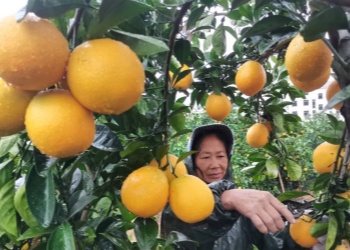
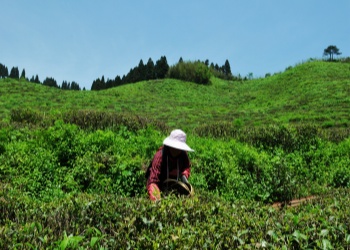
Gannan Navel Oranges Lushan Cloud and Mist Tea




































